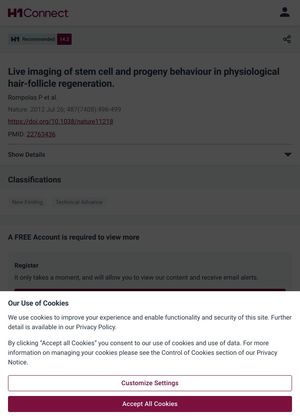Live Imaging of Stem Cell and Progeny Behavior in Physiological Hair-Follicle Regeneration
October 2012
in “
Faculty Opinions – Post-Publication Peer Review of the Biomedical Literature
”
hair follicle regeneration stem cells progeny intravital two-photon imaging transgenic mouse green fluorescent protein GFP keratin 14 promoter HF epithelial cells mitotic activities bulge stem cells dermal papilla DP mesenchymal component HF homeostasis two-photon imaging epithelial cells homeostasis

TLDR Scientists used a special imaging technique to observe that hair follicle regeneration involves cell division and structural changes, mostly in the lower part of the follicle, and that the dermal papilla at the base is crucial for regrowth.
In 2012, Rompolas P et al. conducted a study to understand the behavior of stem cells and their progeny during physiological hair follicle (HF) regeneration. They used a novel, non-invasive, intravital two-photon imaging technique to record these behaviors. The study utilized a transgenic mouse line expressing green fluorescent protein (GFP) fused to histone H2B under the control of the keratin 14 promoter, which allowed the researchers to visualize and track the nucleus of individual HF epithelial cells in vivo. The researchers found that at the early stage of HF regeneration, mitotic activities were mostly observed in the lower part of the HF, where the progeny resides, and less frequently in the bulge stem cells. They also found that the HF undergoes major structural reorganization by morphological rearrangement in addition to cell division. The study also demonstrated that the dermal papilla (DP), a specialized mesenchymal component located at the base of the HF, is indispensable for HF regrowth. The technique developed in this study provides a valuable tool for further research into dynamic cell behaviors maintaining HF homeostasis.



